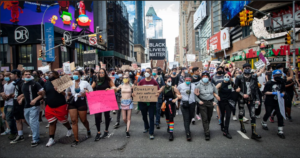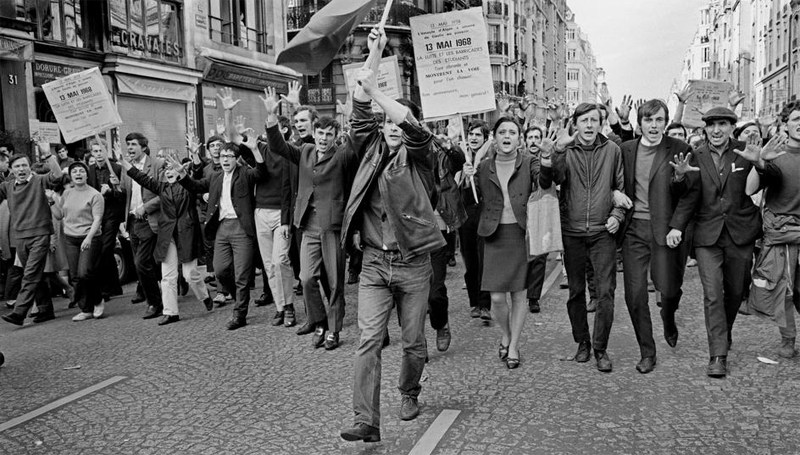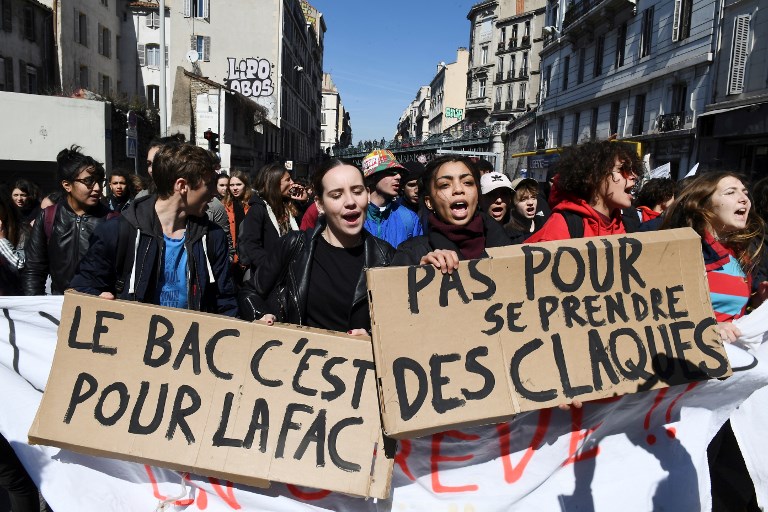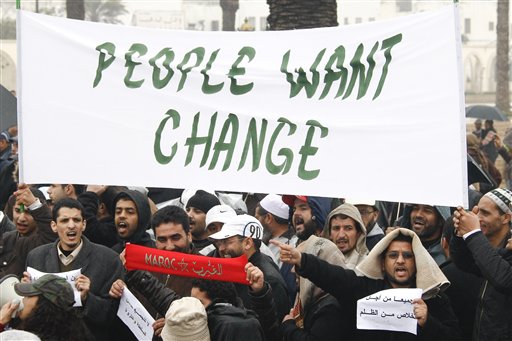Richard Greeman is a Marxist scholar long active in human rights, anti-war, anti-nuclear, environmental and labor struggles in the U.S., Latin America, France, and Russia. Greeman is best known for his studies and translations of the Franco-Russian novelist and revolutionary Victor Serge (1890–1947). Greeman also writes regularly about politics, international class struggles and revolutionary theory. Co-founder of the Praxis Research and Education Center in Moscow, Russia, and director of the International Victor Serge Foundation, Greeman splits his time between Montpellier, France and New York City.

Sparked by the police murder of George Floyd and fueled by Minneapolis authorities’ reluctance to arrest and charge the murderer’s three police accomplices, mass protests have been sweeping across the United States with an intensity not seen since the 1960s.

The nationwide general strike in France, now in its record seventh week, seems to be approaching its crisis point. Despite savage police repression, about a million people are in the streets protesting President Macron’s proposed neoliberal “reform” of France’s retirement . . .
Read more ›

(Montpellier, France) On the eve of an “unlimited” (open-ended) General Strike called for Dec. 5, more and more unions and protest groups are pledging join in.
Two things are unusual about this strike. The first is that it is open-ended, rather . . .
Read more ›

Montpellier, France, Nov. 18, 2019
This weekend the Yellow Vests celebrated their first birthday, with convivial barbeques on traffic circles (roundabouts) all over France followed by direct actions like liberating tollbooths. Although number of protestors has declined to about 10% of . . .
Read more ›

(Montpellier, April 10) After five months of constant presence at traffic circles, toll-booths and hazardous Saturday marches, the massive, self-organized social movement known as the Yellow Vests has just held its second nationwide “Assembly of Assemblies.” Hundreds of autonomous Yellow . . .
Read more ›

The situation here may be reaching a showdown between the Macron government, which is now considering using the Army against the Yellow Vests, and the social movement, to whose demands the regime continues to turn a deaf ear.
In the last . . .
Read more ›

On Tues, Feb. 5, as the Macron government pushed harsh repressive laws against demonstrators through the National Assembly, the Yellow Vests joined with France’s unions for the first time in a day-long, nation-wide “General Strike.” . . .
Read more ›
 Is the Yellow Vest (Gilets Jaunes) rebellion, now in its seventh week, “petering out?” Such was the near-unanimous pronouncement of the mainstream media, when I returned home to Montpellier, France, eager to participate and to observe first-hand this popular insurrection which I had been afraid of missing.
Is the Yellow Vest (Gilets Jaunes) rebellion, now in its seventh week, “petering out?” Such was the near-unanimous pronouncement of the mainstream media, when I returned home to Montpellier, France, eager to participate and to observe first-hand this popular insurrection which I had been afraid of missing.
 As the French get ready for the “rentrée” – the annual back-to-school/back-to-work day following the August vacation – social peace appears to reign in the land. The long-expected militant strikes and struggles against the neo-liberal counter-reforms introduced by President Macron early last Spring have failed to materialize. Surprisingly, the Macron government successfully force-marched its anti-labor, anti-welfare, pro-business agenda through parliament with little effective resistance by the unions and Left parties. Meanwhile, in the U.S., a wave of spontaneous teachers’ strikes spread from West Viriginia to other conservative ‘Red’ states, winning significant victories and surprising the media and the labor leadership. The contrast is surprising.
As the French get ready for the “rentrée” – the annual back-to-school/back-to-work day following the August vacation – social peace appears to reign in the land. The long-expected militant strikes and struggles against the neo-liberal counter-reforms introduced by President Macron early last Spring have failed to materialize. Surprisingly, the Macron government successfully force-marched its anti-labor, anti-welfare, pro-business agenda through parliament with little effective resistance by the unions and Left parties. Meanwhile, in the U.S., a wave of spontaneous teachers’ strikes spread from West Viriginia to other conservative ‘Red’ states, winning significant victories and surprising the media and the labor leadership. The contrast is surprising.

— Reprinted from New Politics, vol. VI, no. 3, #23, Summer 1967 (printed June 1968)
At 4 am on April 30 [1968], my wife and I stood with tears streaming down our faces on the corner of Amsterdam Avenue and 117th Street, watching the last of the Fayerweather Hall sit-ins being tossed into waiting police vans. We were not the only ones crying, nor were the tears merely those of pity or self-pity. There was also anger, frustration, and actual joy. The incredible—and inevitable—had happened; the “Big Bust” had come. Seven hundred and twenty student and faculty protesters were under arrest; more than 130 had been beaten up, some quite badly. The last illusions about what was happening were shed.
Mitch Abidor’s New Oral History Explores the Lasting Legacy of the Revolt that Shook France in 1968

Where Are the Riots of Yesteryear?

Not an April Fool’s joke. Here are the facts: Four days ago (March 29) the ultra-conservative Dean of the Montpellier University Law School was summoned to police headquarters, interrogated, hauled into court, and held over in jail for arraignment by the Chief Prosecutor – all on the complaint of nine student strikers, who claim to have been brutally assaulted with Dean Philippe Pétel’s active complicity while ‘occupying’ a school auditorium.

1. “All Governments Lie”
As 1950s investigative reporter I.F. (“Izzy”) Stone famously stated: “All governments lie.”[1] Fake news has historically been the weapon of the rulers, especially when in need of excuses for military aggression.

The Future Historians’ International Study Group and Collaborative Writing Project has obtained the following excerpts from the 2117 high school history book “Then, Now and How.” The title of this chapter is “#MeToo and the origins of today’s egalitarian society.”
For more information, go to http://futurehistorians.org/doku.php?id=start.

A well-researched article by John Eligan in the Aug. 18 N.Y. Times goes beyond denouncing the symbolic racism of Charlotteville’s Confederate statues to expose the more pernicious structural racism embedded in the separate-but-unequal physical segregation of the city. (See “In Charlottesville, Some Say Statue Debate Obscures a Deep Racial Split.”) [1]
Ironically, this segregation was imposed, not during the rise of the KKK in the 1920s, but during the 1960s under the progressive guise of ‘urban renewal.” It was then that the vibrant, relatively prosperous, historical black neighborhoods like Charlotteville’s Vinegar Hill were deliberately razed, left long vacant, and ultimately replaced by soulless public housing and institutional projects.

The good news this May was that French voters rejected far-right Marine Le Pen by a two-to-one margin in the second round of the Presidential election.
The bad news was that France ended up electing Emanuel Macron, an efficient technocrat who consciously incarnates French capital’s need to eliminate the "French exception" and level the wages, rights and benefits of the French common people down to the average of the European Union (which includes Romania and Bulgaria).

Happy Thanksgiving! As we celebrate the America’s founding myth of the Pilgrim Fathers welcomed by the Indians, the National Guard, militarized local police and (unlicensed) security guards continue to brutalize unarmed Standing Rock Sioux Indians (and members of dozens of other tribes) protesting the construction of the unapproved Dakota Access Pipeline on their sacred lands and water sources.[1]
 On Wednesday, Oct. 26, the well-known Moroccan historian and human rights activist Maâti Monjib and five of his colleagues were hauled into the High Court at Rabat to answer charges of “attacks on national security” and “receiving foreign funds.” They are facing up to five years in prison for their activities as investigative journalists, human rights advocates and members of the “February 20th Movement” – the Moroccan version of “Arab Spring” of 2011.
On Wednesday, Oct. 26, the well-known Moroccan historian and human rights activist Maâti Monjib and five of his colleagues were hauled into the High Court at Rabat to answer charges of “attacks on national security” and “receiving foreign funds.” They are facing up to five years in prison for their activities as investigative journalists, human rights advocates and members of the “February 20th Movement” – the Moroccan version of “Arab Spring” of 2011.

This essay was originally written as a letter to the editor of La Gazette de Montpelier. Translated from the French by Nancy Holmstrom.
As a retired American historian, specialized in French civilization, and for the past 20 a resident at the Mediterranean costal town of Palavers-les-Flots, permit me to remind the mayors of our beach towns as well as the Prime Minister of the Republic, of a little historic fact forgotten by those who make an affair of state of modest women who wish to remain covered when they take their children bathing at the beach. This practice is nothing new. It was in almost identical dress that my grandmother and my aunts went bathing around 1900, without anyone being scandalized. (see the attached photo). On the contrary, in that period and up to the 1960s, the girl who wanted to present herself (except on nudist beaches) in a bikini risked being reprimanded by the police and given a ticket – as happened to a woman in a burkini yesterday at Cannes.

[Montpellier, May 26, 2016] “We’ve had enough” is the phrase on everyone’s lips as – against all expectations — the wave of strikes, blockades, disruptions and mass demonstrations begun eleven days ago continues to develop throughout France. Indeed, in the past couple of days, two new strategic groups of workers have joined the protest. Technicians at France’s nuclear power plants are now cutting back on production of electricity, and the railroad workers have massively joined the street protests while cutting back on trains. Meanwhile, there are long lines at the gas pumps as petroleum workers continue to blockade France’s major oil refineries.

Last week, as yet another mega-typhoon laid waste to the Philippines, the leaders of 183 capitalist governments met in Lima, Peru to face the imminent threat of climate catastrophe at a U.N. Climate Conference called COP20. (Yawn.) In case you missed the headlines (they were small), the world leaders agreed to nothing.[1]






 Is the
Is the  As the French get ready for the “rentrée” – the annual back-to-school/back-to-work day following the August vacation – social peace appears to reign in the land. The long-expected militant strikes and struggles against the neo-liberal counter-reforms introduced by President Macron early last Spring have failed to materialize. Surprisingly, the Macron government successfully force-marched its anti-labor, anti-welfare, pro-business agenda through parliament with little effective resistance by the unions and Left parties. Meanwhile, in the U.S., a wave of spontaneous teachers’ strikes spread from West Viriginia to other conservative ‘Red’ states, winning significant victories and surprising the media and the labor leadership. The contrast is surprising.
As the French get ready for the “rentrée” – the annual back-to-school/back-to-work day following the August vacation – social peace appears to reign in the land. The long-expected militant strikes and struggles against the neo-liberal counter-reforms introduced by President Macron early last Spring have failed to materialize. Surprisingly, the Macron government successfully force-marched its anti-labor, anti-welfare, pro-business agenda through parliament with little effective resistance by the unions and Left parties. Meanwhile, in the U.S., a wave of spontaneous teachers’ strikes spread from West Viriginia to other conservative ‘Red’ states, winning significant victories and surprising the media and the labor leadership. The contrast is surprising.











